八年级英语上册unit1---5知识点教案资料
- 格式:doc
- 大小:72.50 KB
- 文档页数:21
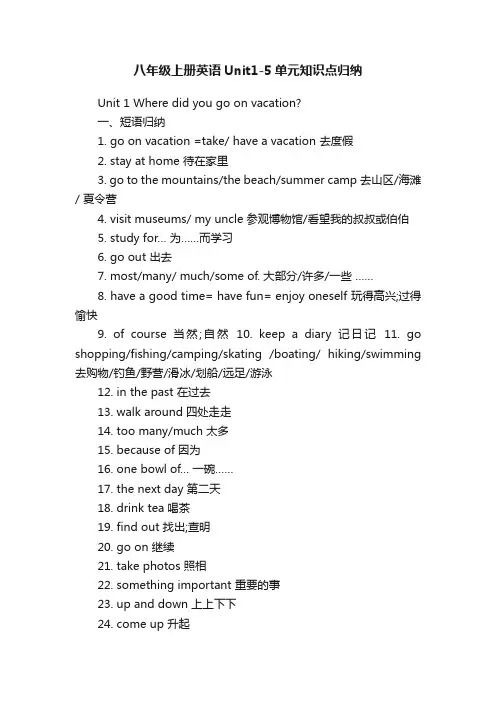
八年级上册英语Unit1-5单元知识点归纳Unit 1 Where did you go on vacation?一、短语归纳1. go on vacation =take/ have a vacation 去度假2. stay at home 待在家里3. go to the mountains/the beach/summer camp 去山区/海滩/ 夏令营4. visit museums/ my uncle 参观博物馆/看望我的叔叔或伯伯5. study for… 为……而学习6. go out 出去7. most/many/ much/some of. 大部分/许多/一些……8. have a good time= have fun= enjoy oneself 玩得高兴;过得愉快9. of course 当然;自然10. keep a diary 记日记11. go shopping/fishing/camping/skating /boating/ hiking/swimming 去购物/钓鱼/野营/滑冰/划船/远足/游泳12. in the past 在过去13. walk around 四处走走14. too many/much 太多15. because of 因为16. one bowl of… 一碗……17. the next day 第二天18. drink tea 喝茶19. find out 找出;查明20. go on 继续21. take photos 照相22. something important 重要的事23. up and down 上上下下24. come up 升起25. wait for 等待26. in excitement 兴奋地;激动地27. bring back…from… .从……带回……28. walk up to 步行到…二、用法集萃1. quite a few/a little/a lot(of) 相当多;不少eg: We took quite a few photos there.我们在那里拍了很多照片。

八年级上册u1到u5知识点八年级的学习内容相对较多,其中Unit1到Unit5的知识点是基础重要的部分。
下面将针对这几个单元的知识点进行详细的讲解,帮助同学们更好地掌握这些基础知识。
Unit 1 – How do you study for a test?本单元重点介绍了如何备考考试以及学习方法和技巧的应用。
具体知识点包括:1. 谈论自己的备考及学习方法2. 给出建议和指导学习方法3. 辨别常见的学习策略的用途和适当的时间点4. 介绍学习策略的目标和效益5. 排列整理优先级,准备学习计划Unit 2 – How often do you exercise?本单元的主要内容是有关健康生活与锻炼的话题,让学生更好地理解身体健康保健的重要性及如何保持健康。
具体知识点包括:1. 谈论生活方式2. 分析健康的生活方式及不健康的生活方式的对比3. 介绍日常锻炼的方法4. 谈论自己的运动偏好与习惯5. 推荐友好的锻炼方式和运动项目Unit 3 – What are you doing for the environment?本单元的内容是关于环保的话题,让学生了解如何保护环境及宣传节约能源、减少浪费。
具体知识点包括:1. 谈论环保的重要性2. 简述环保法规和节约能源的自我责任3. 分析环境问题对生活带来的影响和危害4. 介绍日常生活中的环保习惯5. 推荐环保机构和组织Unit 4 – I used to be afraid of the dark本单元的内容主要是讨论成长、变化和心理方面的话题。
让学生了解人在成长过程中会经历的身体和心理的变化以及应对方法。
具体知识点包括:1. 谈论成长和变化2. 分析身体和心理的变化3. 介绍自我认知和情感养育4. 分析儿童与青少年的焦虑感和压力5. 推荐有关成长和心理养育的资源Unit 5 –What’s the matter?本单元的内容是关于身体疾病和生活健康的话题,让学生了解常见疾病及治疗方法,并掌握如何预防和保护自己的生命健康。
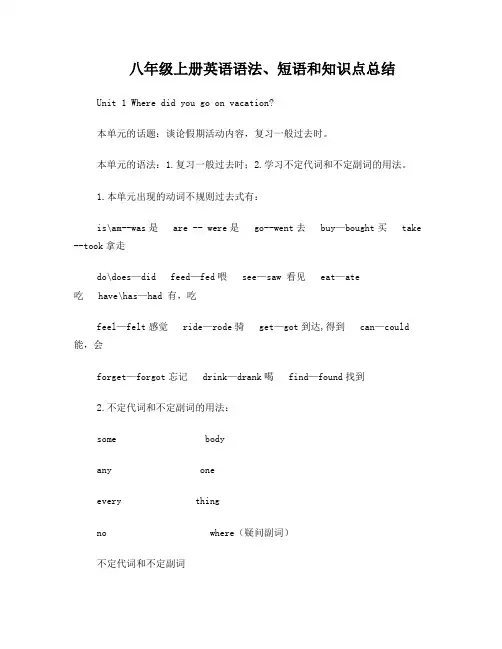
八年级上册英语语法、短语和知识点总结Unit 1 Where did you go on vacation?本单元的话题:谈论假期活动内容,复习一般过去时。
本单元的语法:1.复习一般过去时;2.学习不定代词和不定副词的用法。
1.本单元出现的动词不规则过去式有:is\am--was是 are -- were是 go--went去 buy—bought买 take --took拿走do\does—did feed—fed喂 see—saw 看见 eat—ate吃 have\has—had 有,吃feel—felt感觉 ride—rode骑 get—got到达,得到 can—could 能,会forget—forgot忘记 drink—drank喝 find—found找到2.不定代词和不定副词的用法:some bodyany oneevery thingno where(疑问副词)不定代词和不定副词(1)左边的some、any、every、no与右边的body、one、thing构成不定代词,some、any、every、no与右边的疑问副词where构成不定副词;(2)一般情况下以some开头的不定代词和不定副词用于肯定句,以any开头的不定代词和不定副词用于否定句、疑问句;以no开头的不定代词和不定副词表示否定含义(no one为两个单词);(3)不定代词或不定副词和形容词连用时,形容词放在后面。
He has something important to do.他有重要的事情要做。
(肯定句用something,形容词important放后)Did you buy anything special? (一般疑问句用anything,形容词special放后)Did you go anywhere interesting last month?上个月你去令人感兴趣的地方了吗?(一般疑问句用不定副词anywhere,形容词interesting放后)(4)不定代词和不定副词做主语时,后面的动词用单数形式。
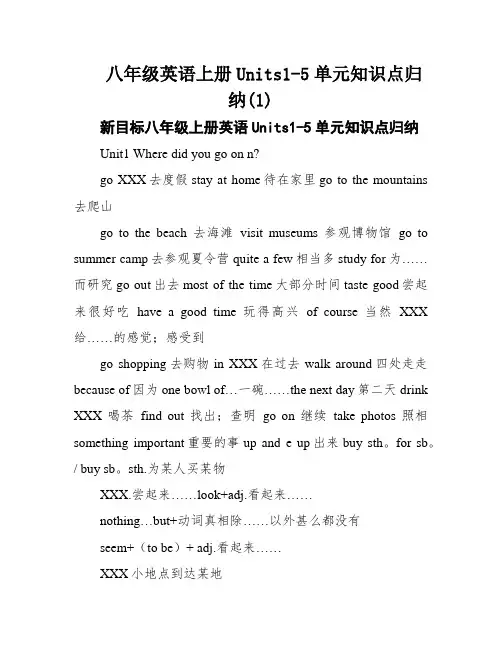
八年级英语上册Units1-5单元知识点归纳(1)新目标八年级上册英语Units1-5单元知识点归纳Unit1 Where did you go on n?go XXX去度假stay at home待在家里go to the mountains 去爬山go to the beach去海滩visit museums参观博物馆go to summer camp去参观夏令营quite a few相当多study for为……而研究go out出去most of the time大部分时间taste good尝起来很好吃have a good time玩得高兴of course当然XXX 给……的感觉;感受到go shopping去购物in XXX在过去walk around四处走走because of因为one bowl of…一碗……the next day第二天drink XXX喝茶find out找出;查明go on继续take photos照相something important重要的事up and e up出来buy sth。
for sb。
/ buy sb。
sth.为某人买某物XXX.尝起来……look+adj.看起来……nothing…but+动词真相除……以外甚么都没有seem+(to be)+ adj.看起来……XXX小地点到达某地XXX do sth.决定去做某事XXX做某事/ try to do sth.极力去做某事XXX.忘记做过某事XXX.忘记做某事XXX喜欢做某事want to do sth.想去做某事start。
XXX停止做某事dislike doing sth.不喜欢做某事keep XXX继续做某事Why not do。
sth。
为什么不做……呢?so+adj.+that+从句如此……以至于……tell sb。
(not) to do sth.告诉某人(不要)做某事Unit2 How often do you exercise?help with housework帮助做家务on XXX在周末how often 多久一次hardly ever几乎从不once a ice a month每月两次every day每天be free有空go to the movies去看电影use the 用互联网swing dance摇摆舞play XXX打网球stay up late熬夜;睡得很晚at least至少have dance and piano lessons上舞蹈课和钢琴课go to bed early 早点睡觉play sports进行体育活动be good for对……有好处go camping去野营not…at all一点儿也不……in one’s free time 在某人的业余时间the most popular最受欢迎的such as比如;诸如old habits die hard积难改go to the dentist去看牙医morn than多于;超过less than少于Unit3 I’m XXX.XXX…与……一样……。

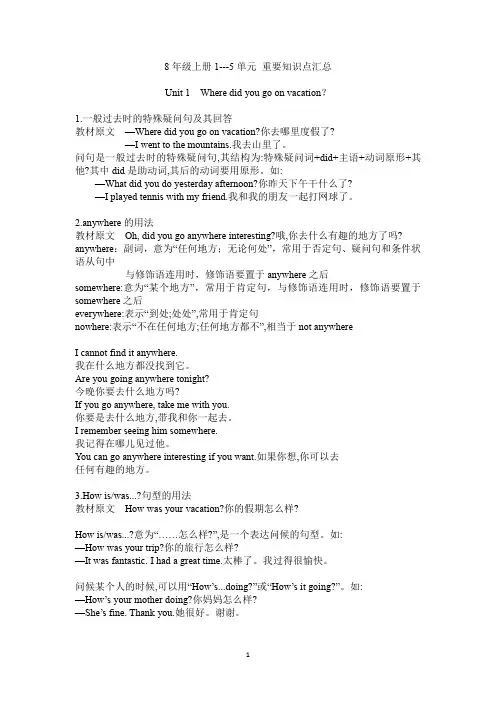
8年级上册1---5单元重要知识点汇总Unit 1 Where did you go on vacation?1.一般过去时的特殊疑问句及其回答教材原文—Where did you go on vacation?你去哪里度假了?—I went to the mountains.我去山里了。
问句是一般过去时的特殊疑问句,其结构为:特殊疑问词+did+主语+动词原形+其他?其中did是助动词,其后的动词要用原形。
如:—What did you do yesterday afternoon?你昨天下午干什么了?—I played tennis with my friend.我和我的朋友一起打网球了。
2.anywhere的用法教材原文Oh, did you go anywhere interesting?哦,你去什么有趣的地方了吗? anywhere:副词,意为“任何地方;无论何处”,常用于否定句、疑问句和条件状语从句中与修饰语连用时,修饰语要置于anywhere之后somewhere:意为“某个地方”,常用于肯定句,与修饰语连用时,修饰语要置于somewhere之后everywhere:表示“到处;处处”,常用于肯定句nowhere:表示“不在任何地方;任何地方都不”,相当于not anywhereI cannot find it anywhere.我在什么地方都没找到它。
Are you going anywhere tonight?今晚你要去什么地方吗?If you go anywhere, take me with you.你要是去什么地方,带我和你一起去。
I remember seeing him somewhere.我记得在哪儿见过他。
You can go anywhere interesting if you want.如果你想,你可以去任何有趣的地方。
3.How is/was...?句型的用法教材原文How was your vacation?你的假期怎么样?How is/was...?意为“……怎么样?”,是一个表达问候的句型。
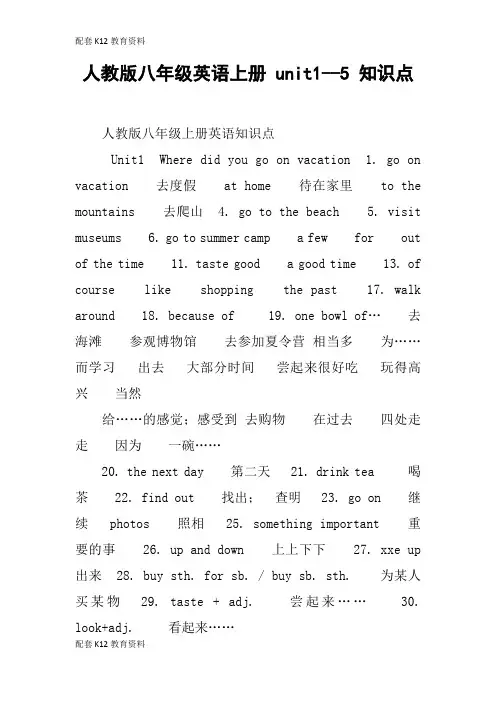
人教版八年级英语上册 unit1--5 知识点人教版八年级上册英语知识点Unit1 Where did you go on vacation 1. go on vacation 去度假at home 待在家里to the mountains 去爬山 4. go to the beach 5. visit museums 6. go to summer camp a few for out of the time 11. taste good a good time 13. of course like shopping the past 17. walk around 18. because of 19. one bowl of…去海滩参观博物馆去参加夏令营相当多为……而学习出去大部分时间尝起来很好吃玩得高兴当然给……的感觉;感受到去购物在过去四处走走因为一碗……20. the next day 第二天 21. drink tea 喝茶22. find out 找出;查明 23. go on 继续 photos 照相 25. something important 重要的事26. up and down 上上下下27. xxe up 出来 28. buy sth. for sb. / buy sb. sth. 为某人买某物29. taste + adj.尝起来……30. look+adj. 看起来………but+动词原形除了……之外什么都没有 ++ adj. 看起来…… 33. arrive in+大地点 / arrive at+小地点到达某地 to do sth. 决定去做某事 35. try doing sth. 尝试做某事 / 36. try to do sth. 尽力去做某事37. forget doing sth. 忘记做过某事/ 38. forget to do sth. 忘记做某事 39. enjoy doing sth. 喜欢做某事 40. want to do sth. 想去做某事41. start doing sth. 开始做某事 42. stop doing sth. 停止做某事 43. dislike doing sth. 不喜欢做某事 44. keep doing sth. 继续做某事 45. Why not do. sth.为什么不做……呢?46. so+adj.+that+从句如此……以至于…… 47. tell sb. (not) to do sth. 告诉某人做某事Unit2 How often do you exercise1 help with housework帮助做家务2 on weekends 在周末3 how often 多久一次4 hardly ever 几乎从不5 once a week 每周一次6 twice a month 每月两次7 every day 每天8 be free 有空9 go to the movies 去看电影 10 use the Internet 用互联网 11 swing dance 摇摆舞 12 play tennis 打网球13 stay up late 熬夜;睡得很晚14 at least 至少15 have dance and piano lessons 上舞蹈课和钢琴课 16 go to bed early 早点睡觉 17 play sports 进行体育活动 18 be good for 对……有好处 19 go camping 去野营20 not…at all 一点儿也不…… 21 in one’s free time 在某人的业余时间22 the most popular 最受欢迎的 23 such as 比如;诸如24 old habits die hard 积习难改25 go to the dentist 去看牙医26 morn than 多于;超过27 less than 少于28 help sb. with sth. 帮助某人做某事29 How about…......怎么样?/ ……好不好? 30 want sb. to do sth. 想让某人做某事31 How many+可数名词复数+一般疑问句?……有多少…… 32 主语+find+that从句. ……发现……33 spend time with sb. 和某人一起度过时光 34 It’s+ adj.+ to do sth. 做某事的……的。
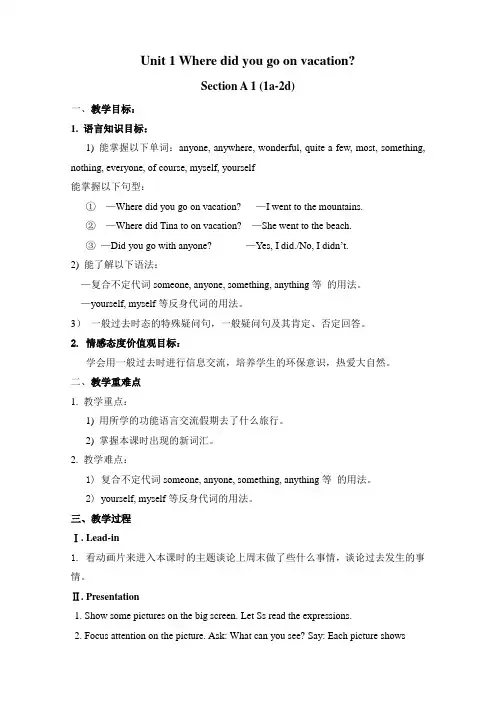
Unit 1 Where did you go on vacation?Section A 1 (1a-2d)一、教学目标:1. 语言知识目标:1) 能掌握以下单词:anyone, anywhere, wonderful, quite a few, most, something, nothing, everyone, of course, myself, yourself能掌握以下句型:①—Where did you go on vacation? —I went to the mountains.②—Where did Tina to on vacation? —She went to the beach.③—Did you go with anyone? —Yes, I did./No, I didn’t.2) 能了解以下语法:—复合不定代词someone, anyone, something, anything等的用法。
—yourself, myself等反身代词的用法。
3)一般过去时态的特殊疑问句,一般疑问句及其肯定、否定回答。
2. 情感态度价值观目标:学会用一般过去时进行信息交流,培养学生的环保意识,热爱大自然。
二、教学重难点1. 教学重点:1) 用所学的功能语言交流假期去了什么旅行。
2) 掌握本课时出现的新词汇。
2. 教学难点:1) 复合不定代词someone, anyone, something, anything等的用法。
2) yourself, myself等反身代词的用法。
三、教学过程Ⅰ. Lead-in1. 看动画片来进入本课时的主题谈论上周末做了些什么事情,谈论过去发生的事情。
Ⅱ. Presentation1. Show some pictures on the big screen. Let Ss read the expressions.2. Focus attention on the picture. Ask: What can you see? Say: Each picture showssomething a person did in the past. Name each activity and ask students to repeat: Stayed at home, Went to mountains, went to New York City 6. Went to the beach, visited my uncle, visited museums, went to summer camp3. Now, please match each phrase with one of the pictures next to the name of the activity,point to the sample answer.4. Check the answers. Answers: 1. f 2. b 3. g 4. e5. c6. a7. dIII. Listening1. Point to the picture on the screen.Say: Look at the picture A. Where did Tina go on vacation? She went to mountains. Ask: What did the person do in each picture?2. Play the recording the first time.3. Play the recording a second time.Say: There are three conversations. The people talk about what did on vacation. Listen to the recording and write numbers of the names in the right boxes of the picture.4. Check the answers.IV.Pair work1. Point out the sample conversation. Ask two Ss to read the conversation to the class.2. Now work with a partner. Make your own conversation about the people in the picture.3. Ss work in pairs. As they talk, move around the classroom and give any help they need.4. Let some pairs act out their conversations.V. Listening1. Tell Ss they will hear a conversation about three students’ conversations. Listen for the first time and fill in the chart. Then listen again and check Yes, or No.2. Let Ss read the phrases in the chart of 2b.3. Play the recording the first time. Ss listen and fill in the chart.4. Play the recording a second time for the Ss to check “Yes, I did.”or “No, I didn’t. ”5. Check the answers with the Ss.VI. Pair work1. Let two Ss read the conversation between Grace, Kevin and Julie.2. Let Ss work in pairs and try to role-play the conversation.3. Ask some pairs to act out their conversations.VII. Role-play1. First let Ss read the conversation and match the people and places they went.2. Let Ss act out the conversations in pairs.3. Some explanations in 2d.Homework:用英语询问你的一位好朋友,她(他)假期去了哪里?看到了什么?并将此对话写在作业上。
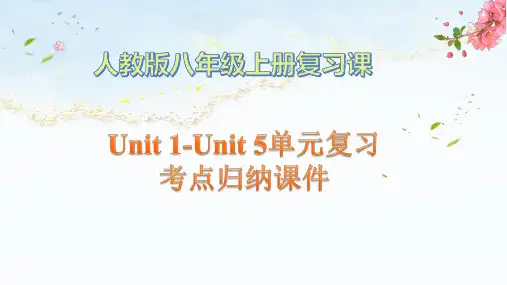
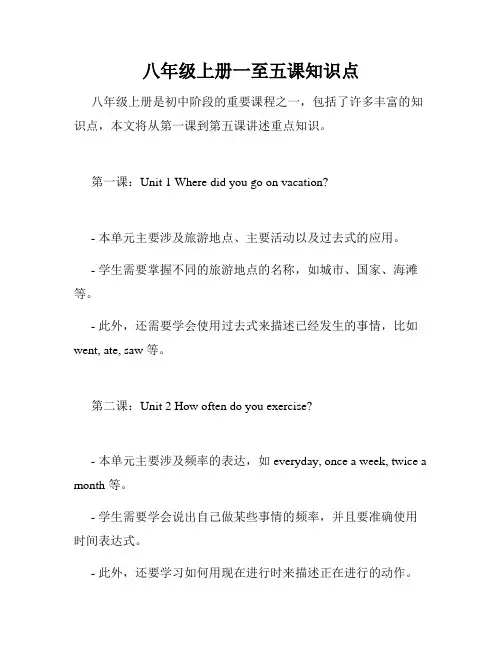
八年级上册一至五课知识点八年级上册是初中阶段的重要课程之一,包括了许多丰富的知识点,本文将从第一课到第五课讲述重点知识。
第一课:Unit 1 Where did you go on vacation?- 本单元主要涉及旅游地点、主要活动以及过去式的应用。
- 学生需要掌握不同的旅游地点的名称,如城市、国家、海滩等。
- 此外,还需要学会使用过去式来描述已经发生的事情,比如went, ate, saw 等。
第二课:Unit 2 How often do you exercise?- 本单元主要涉及频率的表达,如 everyday, once a week, twice a month 等。
- 学生需要学会说出自己做某些事情的频率,并且要准确使用时间表达式。
- 此外,还要学习如何用现在进行时来描述正在进行的动作。
第三课:Unit 3 Why do you like koalas?- 本单元主要涉及表达个人喜好和兴趣爱好。
- 学生需要学会表达自己对于各种事物的看法和感受。
- 此外,还需要学习一些关于动物的词汇,如 endangered species, herbivore, carnivore 等。
第四课:Unit 4 I want to be an actor.- 本单元主要涉及职业和工作的讨论。
- 学生需要学会表达自己对于不同职业的看法和兴趣。
- 此外,还需要学习一些与职业相关的词汇,如 job interview, salary, experience 等。
第五课:Unit 5 Do you want to watch a game show?- 本单元主要涉及娱乐和节目的讨论。
- 学生需要学会表达自己对于不同类型娱乐节目的看法和兴趣。
- 此外,还需要学习一些与娱乐节目相关的词汇,如 game show, reality show, talent show 等。
总的来说,八年级上册课程的主要学习内容是涵盖丰富多彩的,需要学生投入大量的时间和精力来掌握。
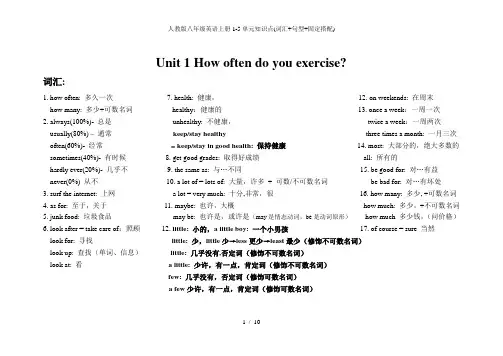
Unit 1 How often do you exercise?词汇:1. how often: 多久一次7. health: 健康,12. on weekends: 在周末how many: 多少+可数名词healthy:健康的13. once a week:一周一次2. always(100%)- 总是unhealthy: 不健康,twice a week:一周两次usually(80%) –通常keep/stay healthy three times a month: 一月三次often(60%)- 经常= keep/stay in good health: 保持健康14. most: 大部分的,绝大多数的sometimes(40%)- 有时候8. get good grades: 取得好成绩all: 所有的hardly ever(20%)- 几乎不9. the same as: 与…不同15. be good for: 对…有益never(0%) 从不10. a lot of = lots of: 大量,许多+ 可数/不可数名词be bad for: 对…有坏处3. surf the internet: 上网 a lot = very much: 十分,非常,很16. how many: 多少, +可数名词4. as for: 至于,关于11. maybe: 也许,大概how much: 多少,+不可数名词5. junk food: 垃圾食品may be: 也许是,或许是(may是情态动词,be是动词原形)how much 多少钱,(问价格)6. look after = take care of:照顾12. little: 小的,a little boy: 一个小男孩17. of course = sure 当然look for: 寻找little: 少,little少→less更少→least最少(修饰不可数名词)look up: 查找(单词、信息)little: 几乎没有,否定词(修饰不可数名词)look at: 看 a little: 少许,有一点,肯定词(修饰不可数名词)few: 几乎没有,否定词(修饰可数名词)a few少许,有一点,肯定词(修饰可数名词)1 / 10句型:1.How often do you exercise? →I exercise three times a week. How often does she shop? →She shops once a month.2.What do you usually do on weekends? →I usually watch TV. How often does she watch TV? →She watches TV everyday.3.How many hours do you sleep every night? 你每晚睡几个小时?→I sleep nine hours every night.How many books do you have? 你有多少本书?→I have 5 books.How much is the sweater? 这件毛衣多少钱?How much water do you have? 你有多少水?(how much: 多少,后面+不可数名词, water是不可数名词)4.What’s your favorite program? 你最喜欢的电视节目是什么?→It’s Animal World.固定搭配:try to do sth.: 尽力做某事,设法做某事try doing sth.: 试着做、尝试做某事help sb. (to) do sth: 帮助某人做某事(to可以省略)want sb. to do sth.: 想要某人做某事2 / 10Unit 2 What’s the matter?词汇:1. have a cold 感冒9. few: 几乎没有,否定词(修饰可数名词)have a fever 发烧 a few少许,有一点,肯定词(修饰不可数名词)have a stomachache 肚子痛little: 几乎没有,否定词(修饰不可数名词)have a headache 头疼 a little: 少许,有一点,肯定词(修饰不可数名词)have a toothache 牙齿疼10. at the moment = now 现在,此刻have a sore throat 喉咙疼11. host family 寄宿家庭have a sore back 背部酸疼12. not…until…直到……时候才……2. lie down and have a good rest 躺下好好休息13. should 应该,情态动词,后+动词原形3. hot tea with honey 加了蜂蜜的热茶should not=shouldn’t4. ill 病了的illness 疾病14. see a doctor 看医生5. advice 建议(不可数名词)see a dentist 看牙医some advice(不能加”s”) 15. too many太多…,修饰可数名词too many students6. be stressed out 有压力的,紧张的too much太多…,修饰不可数名词too much yin7. balance 平衡balanced 平衡的much too 太……,much too big 太大a balanced diet 平衡的饮食16. stay=keep 保持on a diet 节食keep/stay healthy8. get 变得= keep/stay in good health: 保持健康get angry 变得生气get tired 变得劳累3 / 10句型:1. What’s the matter with you? = What’s the trouble with you? = What’s wrong with you? 你怎么了?→I have a cold/ have a toothache/ have a sore throat….2. Wha t’s the matter? →She has a cold.3. Does he have a cold? →Yes, he does.4. A: What’s the matter?B: I’m not feeling well.(此处不能用good) I have a cold.A: When did it start?B: About two days ago.A: That’s too bad. You should drink lots of water.B: Yes, I think so.A: I hope you feel / get better soon. 我希望你尽快好起来5. A: I have a coldB: I am sorry to hear that. (当听到对方不好的消息时使用此句)固定搭配:It is + 形容词+ (for sb.) to do sth. 做某事对某人来说是………的例句:It is easy for me to learn (learn) English. 对我来说学英语是容易的It is interesting to watch (watch) Animal World. 看动物世界时有趣的4 / 10Unit 3 What are you doing for vacation?→→→本单元用现在进行时态表示将来的事情现在进行时态,即be + doing:词汇:1. go camping 去野营 6. a lot = very much 十分、非常、很2. A: What are you doing for vacation? go fishing 去钓鱼 a lot of = lots of 许多、大量B: I am going camping.go shopping 去购物7. away 向远处、离开A: That sounds nice.go swimming 去游泳go away 离开Who are you going with?go hiking 去远足B: I am going with my parents.go bike riding 去骑单车8. stay: 留、停留、呆go sightseeing 去观光旅游 3. Linda is going to Tibet next summer. (划线提问)2. how long 多久、多长时间句型:→Where is Linda going next summer?3. get back 回来get back to school 1. What are you doing for vacation?4. He’s going on the 12th. (划线提问)4. be famous for…以……而闻名→I am visiting my grandparents. →When is he going?5. leave for…离开去……地方What is your brother doing for vacation?leave →(过去式) left →He is going camping. 5. I’m staying there for a week. (划线提问)left: 左边、离开→How long are you staying?5 / 106.当听到对方提出的建议,如:What about playing basketball? How about taking a walk with me? Why not go to the movie? 为什么不去看电影?I am going camping.等句子时,回答可用以下句型:That sounds nice/ good/ interesting/. That’s a good idea. / Good idea. That sounds like a good idea./ Great等.7.当听到对方要去旅行或是准备出行时,如:I am going to Hongkong for a week. I am going hiking in the mountains.时,回答一般用以下句型:Have a good time!8.询问天气:How is the weather? 或是What’s the weather like?9.询问某人的职业:What do you do? What are you? What’s your job? 你的工作是什么?What does your mother do? What is he? 他是干什么的?10.询问某人的性格:What are you like? →I am outgoing/ shy/ quiet.What is he like? 他是个什么样的人?→He is outgoing/ shy/ quiet. 他很外向/害羞/安静10. 询问某人长的什么样子:What does he look like? 他长的什么样子?→He is of medium build/height. 他中等身材/身高.What does your father look like? →He is tall. 他很高11. 询问某人喜欢什么:What do you like? 你喜欢什么?→I like basketball. 我喜欢篮球固定搭配:1.finish doing sth 完成做某件事例:I finished doing my homework. 我完成了我的家庭作业6 / 10Unit 1-3 单元课本语法知识& 在讲解畅优新课堂时补充的语法知识点与固定搭配:1.情态动词后+动词原形(do)已学情态动词:can 能够, must 必须, should 应该, may 也许. would 想,会help sb (to) do sth 帮助某人做某事2. 介词后若接动词,则接动词的ing形式:常见的:what about + doing sth? 做………怎么样?常接doing的固定搭配:1. like doing sth 喜欢做某事2. enjoy doing sth 享受做某事3. have a good/ have fun in doing sth 做某事玩的很开心4. finish doing sth 完成做某件事5. spend +(时间、金钱、精力) doing sth 花时间、金钱、精力做某事= spend +(时间、金钱、精力) on sth3. 不定式,即:to do常接不定式的固定搭配:want sb to do sth 想要某人做某事would like to do sth 想做某事tell sb to do sth 告诉某人做某事ask sb to do sth 要求某人做某事plan to do sth 计划做某事decide to do sth 决定做某事need to do sth 需要做某事forget to do sth 忘记做某事try to do sth 尽力做某事4. 不定代词+ 形容词结构例:something interesting 一些有趣的事情7 / 10Unit 4 How do you get to school?词汇:1. get to: 到达arrive at: 到达+ 小地点(学校、医院…)arrive in: 到达+ 大地点(城市、国家、地区…)reach: 到达2. take the bus = by bus:坐公交车8. how long: 多久,how far:多远13. take…to…把…带到…3. take the train = by train:坐火车9. from…to…从…到…14. from: 离…的距离4. take the subway = by subway:坐地铁10. think of: 认为think about: 考虑15. not all: 不是所有5. ride one’s bike = by bike:骑单车11. around the world = all over the world: 全世界6. walk = on foot:走路12. be different from: 与…不同16. more…than…:比…更…,than: 比7. depend on: 视……而定,决定于……,依靠……17.other 其他的,形容词18. than 比others 其他的人或其他的事19. more…than…比……更……,形容词比较级的用法the other 两者中的另一个,单数概念the others 两部分中的另一部分,复数概念another 另外一个,另外的,第三个的8 / 10句型:1. How do you get to school? →I take the bus. / I go to school by bus.How does she get to school? →She takes the bus. / She goes to school by bus.2. How long does it take?→It takes about/around 10 minutes. →It takes about 25 minutes to walk and 10 minutes by bus. How long does it take you to get from home to school? →It takes 25 minutes.3. How far is it from your home to school? →It’s 3 miles./10 kilometers.4. What do you think of………? = how do you like……? 你认为……怎么样?5. How far do you live from school?你住的离学校有多远→I live 10 miles from school.6. Can I help you? May I help you? →Yes, please.固定搭配:1.It takes sb. + 时间+ to do sth. 例句:It takes me 20 minutes to walk (walk)2.need to do sth. 需要做某事3.more…than…比……更……,形容词比较级的用法4 形容词的比较级&最高级:规则变化:比较级:形容词尾+“er”,最高级:+“est ”,例:big →bigger →the biggest不规则变化:三个音节及以上的形容词(比较长的形容词),比较级:前面+ more, 最高级:前面+most,例:popular 流行的→more popular更流行的→the most popular 最流行的最高级前面+“the”例:This classroom is bigger than that one. 这件教室比那间大This classroom is the biggest. 这间教室是最大的9 / 10Unit 5 Can you come to my party?词汇:1. other 其他的The other 另一个(两个中的另一个) 9. have to 不得不,要…The others 另一部分(两部分中的另一部分)10. babysit= look after = take care of = care for 关心,照顾Another 另外的,另一个(三个以上中的另一个)2. the day before yesterday 前天句型:yesterday 昨天 1. Can you come to my party?today 今天Yes, I’d love to.(肯定回答)tomorrow 明天I’m sorry, I can’t. I have to……(否定回答)the day after tomorrow 后天 2. What’s today? 今天星期几,几号?(星期、日期都可以问) 3. on weekends 在周末It’s Monday the 14th. 今天14号星期一。
八年级英语上册unit1--unit5短语与用法(2020新版)教学设计Teaching design of phrases and usages of Unit 1 -- Unit5 (2020 Edition) in English volume 1 of Grade 8八年级英语上册unit1--unit5短语与用法(2020新版)教学设计前言:小泰温馨提醒,英语作为在许多国际组织或者会议上都是必需语言,几乎所有学校选择英语作为其主要或唯一的外语必修课。
英语教学涉及多种专业理论知识,包括语言学、第二语言习得、词汇学、句法学、文体学、语料库理论、认知心理学等内容。
本教案根据英语课程标准的要求和针对教学对象是初中生群体的特点,将教学诸要素有序安排,确定合适的教学方案的设想和计划、并以启迪发展学生智力为根本目的。
便于学习和使用,本文下载后内容可随意修改调整及打印。
unit one短语归纳1.去度假 go on vacation2.待在家里 stay at home3.去爬山 go to the mountains4.参观博物馆 visit museums5.去参加夏令营 go to summer camp6.相当多 quite a few7.为……而学习 study for8.出去 go out9.大部分时间 most of the time10.尝起来很好吃 taste good11.玩得高兴,过得愉快 have a good time12.当然 of course13.给……的感觉;感受到 feel like14.去买东西 go shopping15.在过去 in the past16.四处走走 walk around17.太多 too many18.因为 because of19.一碗…… a bowl of20.第二天 the nest day21.喝茶 drink tea22.查明 find out23.继续 go on24.照相 take photos25.重要的事情 something important26.上上下下 up and down27.出来 come up1.为某人买某物 buy sth for sb =buy sb sth2.除了……之外什么都没有 nothing ……but3.到达某地 arrive in / arrive at4.决定做某事 decide to do sth5.尽力做某事 try to do sth6.尝试做某事 try doing sht x kb1.c om7.喜欢做某事 enjoy doing sth=like doing sth8.不喜欢做某事 dislike doing sth9.想去做某事 want to do sth10.开始做某事 start doing sth11.停止做某事 stop doing sth12.看起来 look + 形容词13.尝起来 taste + 形容词14.看起来 seem + 形容词15.为什么不做……呢? why not do sth ?16.如此……以至于……so …… that ……17.告诉某人(不要)做某事 tell sb (not )to do sth18.继续做某事 keep doing sth19.忘记做某事 forget to do sth20.忘记做过某事 forget doing sthunit two短语归纳1.帮助某人做某事 help with2.去买东西 go shopping3.在周末 on weekends4.多久一次 how often5.几乎从不 hardly ever6.每周一次 once a week7.每月两次 twice a month8.去看电影 go to the movies9.每天 every day10.用互联网 use the internet11.有空 be free12.上……课have ……classes13.打网球 play tennis14.熬夜,睡得很晚 stay up late15.进行体育活动 play sports16.对……有好处be good for ……17.去野营 go camping18.在某人的业余时间in one’s free time19.一点儿也不 not at all20.比如 such as21.积习难改 old habits die hard22.去看牙医 go to the dentist23.多余 more than24.少于 less than1.……怎么样?…… 好不好how about ……?2.想让某人做某事 want sb to do sth3.……有多少……? how many4.…… 发现…… find+ that 从句5.做某事是……的it’s + adj + to do sth6.和某人一起度过时光 spend time with sb7.向某人询问某事 ask sb about sth8.通过做某事 by doing sth9.你最喜爱的……是什么?what’s yourfavourite ……10.做某事的最好方法 the best way to do sth短语归纳1.更外向 moreoutgoing 2.与……一样as ……as ……3.歌唱比赛 the singingcompetition 4.最重要的 the most important5.有音乐天赋 be talented inmusic 6.和……相同;与……一致 the same as7.开心;介意 careabout 8.与……不同 be different from9.像一面镜子 like amirror 10.只要;既然 as long as11.使显现;使表现出 bringout 12.取得更好的成绩 get better grades13.伸手取 reachfor 14.感动某人touch one’s heart15.事实上;实际上 infact 16.交朋友 make friends17.擅长…… be goodat…… 18.其他的 the other19.与……想像的/类似的 be similarto …… 20.善于与……相处 be good with1.享受做某事的乐趣 have fun doing sth2.想要做某事 want to do sth3.与……一样……as ……as4.擅长做某事 be good at5.让某人做某事 make sb do sth.6.对某人来说,做某事是……的it’s +形容词+for sb. to do sth1.电影院 movie theater2.离…… 近close to ……3.服装店 clothes store4.在镇上 in town5.到目前为止 so far6.坐公共车10 分钟的路程 10 minutes by bus7.世界各地 around the world8.越来越…… more and more ……9.等等 and so on10.共同;共有 in common11.各种各样的all kinds of ……12.是……的职责;由……决定 be up to13.在……方面发挥作用/有影响 play a rolein ……14.编造 make up15.例如 for example16.认真对待…… take ……seriously17.给某人某物 give sb. sth.18.(梦想、希望)实现;达到 come true1.我能问你一些…… 吗? can i ask you some……?2.你认为……怎么样?how do you like ……?3.因做某事而感谢 thanks for doing sth4.你认为……怎么样?what do you think of ……?5.……得多 much + 比较级6.观看某人做某事 watch sb. do sth.7.发挥做某事的作用 play a role in doing sth8.……之一 one of + 可数名词的复数1.认为 think of2.从……获得;向……学习learn from……3.查明;弄清楚 find out4.谈话节目 talk show5.游戏节目 game show6.肥皂剧 soap opera7.发生 go on8.看电影 watch a movei9.一双;一对 a pair of10.尽某人最大的能力try one’s best to do sth11.看起来像 look like12.与……一样有名 as famous as13.就……讨论 have a discussion about14.有一天 one day15.……的象征 a symbol of ……16.打扮;梳理 make up17.代替;替换take sb. ‘s place18.干得好 do a good job19.有趣的资料 interesting information1.让某人做某事 let sb. do sth2.计划/打算做某事 plan to do sth.3.希望做某事 hope to do sth.4.碰巧做某事 happen to do sth.5.盼望做某事 expect to do sth.6.做……怎么样?how about doing ……?7.乐于做某事 be ready to do sth.-------- Designed By JinTai College ---------。
1.学习目标:1.能记住并能正确运用本课时的单词和词组。
2. 熟练运用用来描述过去假期生活的词汇和句型。
学习重点: 用一般过去时态描述自己的旅行学习难点:一般过去时态的灵活运用。
教学过程:本课主要是通过自学,互学,展学,来复习动词一般过去式的变化规律以及句型结构。
用小组展学来验收学习成果。
第三部分达标检测( ) 1. A. city B. house C. country D. village( ) 2. A. learned B. enjoyed C. played D. swam( ) 3. A. talk B. walk C. look D. say( ) 4. A. cold B. cloudy C. warm D. wet( ) 5. A. reading B. living C. sitting D. studying( ) 6. A. can B. am C. do D. did( ) 7. A. good B. cheap C. delicious D. well( ) 8. A. nothing B. everyone C. no one D. something( ) 9. A. him B. you C. them D. themselves( ) 10. A. what B. how C. who D. which(二)阅读理解ATom got up at eight o’clock and then had his breakfast. His mother cooked his favoritefood---chicken noodles for him. After breakfast, Tom began to do his homework. He didn’t have too much homework, because teachers wanted them to have a good rest during weekends.At thirty past nine, Tom read his favorite book Harry Potter. It was really a great book. After that, he listened to Jay’s songs. At eleven, he went to his friend Mike’s party at KFC. They were very happy because they ate their favorite food- hamburgers.Lunch was over at about one thirty in the afternoon. Then they all went to see a new movie.This was Tom’s Sunday. He really had a good time.( ) 1. What food did Tony like best?A. Milk and eggs.B. Egg noodles.C. Chicken noodles( ) 2. When did Tom read his favorite book?A. At 9:30 am.B. At 9:00 am.C. At 8:30 am.( ) 3. Tom and all his friends all liked _______ best.A. vegetablesB. fruitC. hamburgers( ) 4. What did Tom and his best friend do after lunch?A. They went to KFC.B. They listened to Jay’s songs.C. They watched a movie. ( ) 5. Which of the following is true?A. Tom had too much homework.B. Tom’s favorite book is Harry Potter.C. Tom went to Mike’s party at 9:00.BLove, sometimes we can’t see it!This is an old story. One day, a man was not happy when his 7-year-old daughter made a box with some paper. The family didn’t have much money. So the father thought his daughter wasted(浪费)the paper. The next day, the little girl gave the box to her father and said,“Dad, today is your birthday. This b ox is for you. ”The man was happy. But he was not happy again when he found there was nothing in the box. “Why didn’t you put anything for me in the box?” He asked his daughter. The little girl looked at him and cried, “Dad, I put my love in the box. It’s all for you!”The man felt sad and said sorry to his daughter. Sometimes, we can’t see love with our eyes. () 1. How old was the daughter?A. Six years old.B. Seven years old.C. Eight years old.( ) 2. What did the daughter do the next day?A. She gave the box to her father.B. She put some money in the box.C. She gave some paper to her father.( ) 3. Why was the father was not happy again when he opened the box?A. Because he didn’t like the box.B. Because there was nothing in the box.C. Because he thought his daughter wasted paper.( ) 4. How did the father feel at last?A. Happy.B. Sorry.C. Bored.( ) 5. Which of the following is true?A. The family had lots of money.B. The daughter loved her father.C. The father didn’t like his daughter.第四部分写作案例(10分钟)。
八年级英语上册知识点Unit 1 Where did you go on vacation?【Section B】1、到达:arrive in + 大地点 arrive at + 小地点get to + 地点 reach + 地点2、决定去做某事:decide to do sth决定不做某事: decide not to do sth(n.) decision 决定 make a decision 做决定3、try doing sth 尝试做某事try to do sth 尽力做某事try one's best to do sth 尽某人最大的努力去做某事try( 三单)tries (过去式) tried4、feel like 1) 感觉像2)想要:想要做某事:want to do sth= would like to do sth=feel like doing sth 5、在一段时间之前:一段时间+ ago = before + 一段时间在一段时间之后:一段时间+later = after + 一段时间6、喜欢做某事:enjoy doing sth7、感叹句:What + a/ an +adj. +可数n.单数+主语+谓语!What + adj. + 可数n. 复数/ 不可数名词 + 主语+ 谓语!How + adj./ adv. +主语+谓语!8、different (adj.) 不同的 difference (n.) 不同之处,差别be different from... 与....不同be the same as ... 与...相同9、开始做某事:start doing sth= start to do sthbegin to do sth= begin doing sth10、等待... wait for...11、rain a little 下小雨 rain hard 下大雨12、too many + 可数名词复数 too much + 不可数名词太多much too +adj. / adv. 太....13、because + 句子 because of + n. / 代词/ v-ing14、bring sth to + 地点:把某物带来某地take sth to + 地点:把某物带到某地15、enough : 足够的(地)enough + 名词 enough moneyadj./ adv +enough: big enough16、forget to do sth 忘记去做某事forget doing sth 忘记做过某事remember to do sth 记得去做某事remember doing sth 记得做过某事17、stop to do sth 停下来去做某事stop doing sth 停止做某事18、another + 数词 + n. = 数词+ more + n. 再多....19、dislike doing sth 不喜欢做某事20、so + adj./ adv. + that +从句如此...以至于....表否定:= too +adj./ adv + to do sth 太...以至于不能...so that ... 以便,为了Unit 2 How often do you exercise?【Section A】1、help with housework 帮忙做家务活help sb with sth . 在某方面帮助某人help sb to do sth 帮助某人做某事2、hard (adj.) 坚硬的,困难的(adv.) 努力地hardly : 几乎从不3、surf the Internet 网上冲浪on the Internet 在互联网上4、full (adj.)1) 忙的(反义) free 空闲的2)满的,充满的(反) empty 空的be full of.... 充满...的 The cup is full of water.3) 饱的(反) hungry 饿的5、maybe : 可能,做adv. , 放句首may be : 可能是(情态动词+v原),做谓语Maybe he is right. = He may be right.6、频度副词:always 总是 usually 通常 often 经常 hardly ever 几乎从不sometimes 有时 never 从不位置:助后实前提问:how often 多久一次【Section B】1、in one's free / spare time 在某人的空闲时间free: 1) 空闲的 2)自由的 3)免费的2、ask : 1) 询问 ask sb about sth 询问某人关于某事2)叫 ask sb to do sth 叫某人去做某事3、result: 结果the result of... ...的结果as a result: 结果是4、基数词+ percent + of + the + n.5、not ...at all 根本不(助动词、be、情态动词+not)6、although = though 虽然,不能与But连用7、be popular with .... 在....中受欢迎8、by :1) 乘 by bike2) 在...旁边 by the pool3) 通过 by doing sth4) 在...之前 by + 时间5)由...所作 the book written by Lu Xun8、through:1)通过:by doing sth /through + n2)穿过 through : 从内部穿过:through the forestacross : 从表面穿过 walk across the street9、例如:1) such as + n./ 代词/ v-ing2)for example + 句子10、mind1) n. 头脑,心智 2)v. 介意 mind doing sth11、四个花费1) spend :sb spend +时间/ 钱+ on sthsb spend +时间/ 钱+ in doing sth2) take : It takes sb + 时间+to do sth3) pay : sb pay + 钱+ for sth4) cost : sth cost sb + 钱12、die (v. ) 死亡 dead (adj ) 死的death (n. ) 死亡 dying (adj.) 垂死的13、however : 然而,表转折,用逗号隔开but + 句子14、afraid : adj. 害怕的be afraid of doing sth /to do sth 害怕做某事Unit 3 I’m more outgoing than my sister.【Section A】1、both : 两者都...1) adj. both + n. Both students are from America.2)pron. 助后实前(助动词、be、情态动词之后,实义动词之前)3)both A and B : A和B都4)both of + 宾格/ both of +the +n.区别:both : 两者都 all : 三者或以上都2、反意疑问句:1)前肯后否,前否后肯2)确定主语3)有be 用be , 无be 借助助动词do/does3、形容词和副词的比较级1)含义:用于两者之间的比较,说明前者比后者更...2) 翻译:更...的3)变化规则A. 单音节词和部分双音节词:直接+er taller以字母e 结尾的词,加r later重读闭音节结尾的词,先双写该辅音字母,再加er thinner以辅音字母+y 结尾,变y为i, 再加er earlierB. 多音节词和部分双音节词:more + 原级4)不规则变化good/wellbetterbad/ badlyworsemany/muchmorelittlelessoldolder/ elderfarfarther/ further5) 句式结构A+ be/ 实义动词 +比较级+ than BWho/ Which + be/ 实义动词 +比较级..., A or B?越来越.... 单音节词或部分双音节词:比较级 and 比较级多音节词和部分双音节词:more and more + 原级越... 越...: the + 比较级+句子,the + 比较级+ 句子甲是两者中较....的:甲+ be the +形容词比较级+of the two...修饰比较级的词:两多两少一甚远(much、a lot、a little、a bit、even、far) 6)同级比较:as + 原级 + as 和...一样 not as/ so .... as.... 不如.....【Section B】1、talent (n.) 天赋,才能 have a talent for...talented (adj.) 有才能的 be talented in ... 在...方面有天赋2、care (v.) 关心,在意1) care about .... 关心,在意2)care for = take care of... = look after 照顾careful (adj.) 小心的,仔细的 carefully (adv.)careless (adj.) 粗心的3、make sb do sth 让某人做某事make sb + adj. 让某人怎么样4、true (adj. ) 正确的 truly (adv.) 真正地 truth (n.) 真相5、laugh at sb 嘲笑某人(大笑) smile 微笑6、serious (adj.)1)严重的,严肃的2)认真的 be serious about....7、that's why + 结果 that's because + 原因8、as long as1) 只要,既然+ 条件状语从句2)和... 一样长9、bring out the best in sb 把某人最好的一面展现出来10、reach :1) 伸手 reach for one's hand 伸手帮某人一把2)到达 reach sw.11、touch1) 触摸2)感动:touch one's heart12、as the saying goes 正如谚语所说13、break (过去式) broke1)摔断 break the leg2) 打破 break the window3)违反 break the rules14、share sth with sb 和某人分享某物15、be the same as..... 和....相同be similar to .... 与...相似be different from ..... 与....不同Unit 5 Do you want to watch a game show?【Section A】show : 1) 节目:sports show 2) 展示 show sth to sbstand 1) 站立 stand up 2) 忍受:stand doing sthmind 1)n. 头脑,心智 2) v. 介意 mind doing sthI can't stand. 我不能忍受。
1——5单元知识点总结单元知识点总结Unit 1 How often do you exercise?1.how often…?询问事情发生频率。
…?询问事情发生频率。
2.on weekends 在周末在周末3.go to the movies 去看电影去看电影4.频率副词,常用疑问词how often 提问,表示的频率高低由高至低递减:提问,表示的频率高低由高至低递减: always(100%)=all the time 总是,永远总是,永远usually(80%)通常,经常)通常,经常often(30-50%)经常)经常sometimes(20%)=at times 有时有时hardly ever(5%)=难得,几乎不(含有否定意义)难得,几乎不(含有否定意义)never(0%)=根本不,从不根本不,从不5.表频度的词还有,every day 每天,once a week 一周一次,twice a week一周两次,three times week 一周三次。
其规律为:once、twice为特殊,三次及以上的次数表达方法为:基数a a week 天、周、月、年等时间词。
词+times+a+天、周、月、年等时间词。
6.as for至于,关于至于,关于7.want sb. to do sth.想让某人做某事想让某人做某事8.be good for对…有好处对…有好处9.be bad for对…有坏处对…有坏处10.try to do sth.试图做某事,尽量做某事试图做某事,尽量做某事11.look after 照顾,关照,照看,注重照顾,关照,照看,注重12.help sb.(to)do sth.帮助某人做某事帮助某人做某事帮助某人做某事13.keep in…保持某种状态…保持某种状态14.How many hours do/does sb. do sth?某人做某事用少小时?回答为For…hours.(for 在这里表示时间的持续)表示时间的持续)15.like doing sth.喜欢做某事(倾向于某种爱好)喜欢做某事(倾向于某种爱好)like to do sth.喜欢做某事(倾向于某种习惯,某一具体的动作)喜欢做某事(倾向于某种习惯,某一具体的动作)16.eating habits饮食习惯,eating动词+ing表动名词,饮食表动名词,饮食17.surf the Internet网上冲浪网上冲浪18.the same as…与…相同…与…相同…与…相同19.be different from与…不同与…不同Unit2 What’s the matter?1.matter事情,通常指麻烦的事情。
八年级英语上册unit1---5知识点教案资料八年级英语上册u n i t1---5知识点Unit1一、词组、短语:1、go on vacation去度假,2、 stay at home 呆在家,3、go to the mountains 上山/进山,4、 go to the beach到海边去,5、visit museums 参观博物馆,6、go to summer camp 去夏令营,7、 quite a few 相当多, 8、study for为……学习,9、go out 出去, 10、most of the time 大部分时间/绝大多数时间,11、taste good 尝起来味道好, 12、have a good time玩的开心,13、of course当然可以, 14、feel like感觉像……/想要15、 go shopping购物, 16、in the past 在过去,17、walk around绕……走, 18、too many 太多(可数名词前面),19、because of 因为, 20、one bowl of 一碗……,21、find out 查出来/发现, 22、go on继续,23、take photos 照相,24、something important重要的事情,25、up and down上上下下, 26、come up出来二、重要句子(语法):1.Where did you go on vacation?你到哪里去度假了?I went to New York City.我去了纽约城2.Did you go out with anyone? 你出去带人吗?No, No one was here. Everyone was on vacation.不,没有人在这了,大家都度假去了了。
3. Did you buy anything special?你买了什么特别的东西吗?Yes, I bought something for my father.对,我给父亲买了一些东西。
八年级英语上册u n i t1---5知识点Unit1一、词组、短语:1、go on vacation去度假,2、 stay at home 呆在家,3、go to the mountains 上山/进山,4、 go to the beach到海边去,5、visit museums 参观博物馆,6、go to summer camp 去夏令营,7、 quite a few 相当多, 8、study for为……学习,9、go out 出去, 10、most of the time 大部分时间/绝大多数时间,11、taste good 尝起来味道好, 12、have a good time玩的开心,13、of course当然可以, 14、feel like感觉像……/想要15、 go shopping购物, 16、in the past 在过去,17、walk around绕……走, 18、too many 太多(可数名词前面),19、because of 因为, 20、one bowl of 一碗……,21、find out 查出来/发现, 22、go on继续,23、take photos 照相, 24、something important重要的事情,25、up and down上上下下, 26、come up出来二、重要句子(语法):1.Where did you go on vacation?你到哪里去度假了?I went to New York City.我去了纽约城2.Did you go out with anyone? 你出去带人吗?No, No one was here. Everyone was on vacation.不,没有人在这了,大家都度假去了了。
3. Did you buy anything special?你买了什么特别的东西吗?Yes, I bought something for my father.对,我给父亲买了一些东西。
4.How was the food? 食物怎么样?Everything tasted really good.每一样东西真的都好吃。
5.Did everyone have a good time?大家玩的开心吗?Oh, yes. Everything was excellent.对,一切都很精彩。
三、习惯用法、搭配1. buy sth. for ab./ buy sb. sth. 为某人买某物2. taste + adj. 尝起来……3. nothing …,but + V.(原形) 除了……之外什么都没有4. seem + (to be) + adj 看起来 12. look + adj 看起来5. arrive in + 大地方 / arrive at + 小地方到达某地6. decide to do sth. 决定做某事7. try doing sth. / try to do sth. 尝试 / 尽力做某事8. enjoy doing sth. 喜欢做某事 9. want to do sth. 想去做某事10. start doing sth. 开始做某事 11. stop doing sth. 停止做某事12.stop to do sth.停下来去做某事。
13. dislike doing sth. 不喜欢做某事14. Why not do sth. 为什么不做…….呢?15. so + adj + that + 从句如此……以至于……17. keep doing sth. 继续做某事16. tell sb. (not) to do sth. 告诉某人(不要)做某事18. forget to do sth. 忘记去做某事 / forget doing sth 忘记做过某事四、词语辨析:1.visited my uncle 看望了我的叔叔(P1)visit是及物动词,意为―拜访;探望,后接表示人的名词或代词。
visit还可以意为―参观;游览,后接表示地点的名词。
a.I visited my grandmother last week. 上周我去______了我的外婆。
b.Do you want to visit Shanghai? 你想______上海吗?拓展:visitor意为―参观者;游客‖。
eg: These visitors come from America.2.buy anything special 买特别的东西。
(P2)1)buy及物动词,意为―买;购买。
其过去式为bought拓展:buy sth. for sb.=buy sb. sth. 意为―给某人买某物。
My uncle_____ _____a bike.= My uncle_____ _____for me.2)anything不定代词,意为―某事;某件东西,主要用于疑问句或否定句中。
a.Do you want anything from me?b.I can’t say anything about it.3) anthing special表示―特别的东西,形容词修饰不定代词时后置。
Is there________ ________in this book?这本书里有新的内容吗?4.Oh, did you go anywhere interesting?哦,你去有趣的地方了吗?(P2)辨析:anywhere与somewhereanywhere意为―在任何地方,常用于否定句和疑问句中。
eg:I can‘t find it anywhere.somewhere意为―在某处;到某处,常用于肯定句中。
eg:I lost my key somewhere near here.5.We took quite a few photos there.我们在那里拍了不少照片。
(P2)辨析:quite a few与quite a littlequite a few 意为―很多;不少,修饰可数名词复数;quite a little 意为―很多;不少,修饰不可数名词。
a.He stays here for _____ _____ _____days.b. b.There is _____ _____ _____water in the bottle(瓶子).6. I just stayed at home most of the time to read and relax. 我大部分时间只是待在家里读书休息。
(P2)拓展most of…意为―……中的大多数,它作主语时,谓语动词取决于most of 后所修饰的名词。
a. Most of us_____(be)going to the park. 我们大多数人要去公园。
b. Most of the food_____(go)bad. 大部分的食物都变质了。
7.Everything tasted really good!所有的东西尝起来真的很好吃!(P3)taste在此为系动词,意为―尝起来,其后接形容词构成系表结构。
a.The food tastes really great.食物尝起来棒极了。
8.How did you like it? 你觉得它怎么样?(P3)How do/did you like……? 意为―你觉得……怎么样?‖,用来询问对方的观点或看法,相当于 What do you think of……?9. Still no one seemed to be bored. (即使这样)仍然没有人看起来无聊。
(P3)1)seem意为―好像;似乎;看来。
Everything seems easy.一切似乎很容易。
拓展a. seem+adj. ―看起来……。
You seem happy today.你今天看起来很高兴。
b. seem+to do sth. ―似乎,好像做某事。
I seem to have a cold.我似乎感冒了。
c. It seems/seemed+从句―看起来好像…;似乎…。
It seems that no one believes you.看起来好像没有人相信你。
2)辨析:bored与boringa. bored意为―厌烦的;感到无聊的‖,一般在句中修饰人。
b. boring意为―无聊的;令人厌烦的‖,一般在句中修饰事或物。
10. What activities do you find enjoyable? 你发现什么活动让人快乐?(P5)1)activities是activity的复数形式,意为―活动。
2)enjoyable形容词,意为―愉快的;快乐的。
I‘m sure we will have an enjoyable vacation. 我确信我们将会有一个愉快的假期。
11. I arrived in Penang in Malaysia this morning with my family. 今天早上我和家人到达了马来西亚的槟城。
辨析:①arrive in+大地点 / arrive at+小地点②get to +地点③reach+地点12. …so we decided to go to the beach near our hotel…因此我们决定到旅馆附近的海滩上去。
拓展:decide后常跟―疑问词+动词不定式‖做宾语。
He can’t decide when ______ _____(leave) 他不能决定何时动身。
13. I felt like I was a bird. It was so exciting! 我感觉自己就像一只小鸟。
太刺激了!(P5) 1)feel like意为“给……的感觉;感受到”。
其后常接从句。
eg: He feels like he is swimming. 他感觉像在游泳一样。
拓展:feel like还可意为“想要……,其后可接名词、代词或动名词。
即:feel like sth. 想要某物 feel like doing sth. 想要做某事14. There are a lot of new buildings now…现在有许多新的建筑物……(P5)building 可数名词,意为建筑物;楼房。
build 动词,建造,建筑(built,built),15. I wonder what life was like here in the past. 我想知道在这儿过去的生活是什么样的。
(P5)wonder此处是及物动词,意为想知道;琢磨‖。
其后常接who, what, why等疑问词引导的宾语从句。